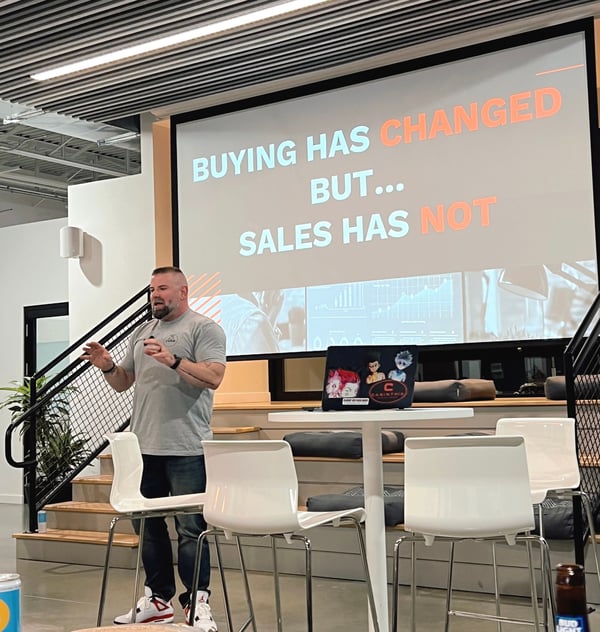2 min read
Buying Has Changed, Sales Hasn't; Now What? Feat. Chris Stilwell (HubHeroes, Ep. 59)
 Liz Moorehead
Nov 14, 2023 11:30:10 AM
Liz Moorehead
Nov 14, 2023 11:30:10 AM
If you've spent any length of time in the inbound space, the idea that buyers have changed how they make their decisions isn't a new concept. Heck, it's the foundation upon which the inbound methodology has been developed for more than a decade.
Still, as marketing and sales teams work to align more closely together, and business owners look at their more old school sales teams to modernize their processes and platforms, there is seemingly a problem.
💥 HubHeroes Throwback: Here's Why Your Sales Enablement Strategy Sucks
While there are certainly tons of forward-thinking, progressive sales reps, teams, and leaders out there, there are still sales organizations struggling or resisting to adopt necessary changes. To be fair, though, us marketers and business leaders aren't always as empathetic or understanding as to why this might be the case.
For example, many years ago at a previous HubSpot agency, my boss told me that because I had been doing such a great job as a content strategist on the marketing team, he wanted me to go be the dedicated content strategist for the sales team.
My immediate response? "Am I being punished?"
I wish I were kidding. I'm a walking embarrassment. I'm sorry, Tom DiScipio.
It turned out to be the most enlightening year of my career, as I witnessed first-hand how sales teams are considered profit centers and relied upon as a company's revenue producers ... but they're often left to fend for themselves, with broken promises, limited resources, and a distinct lack of understanding from other teams they are supposed to be working with.
💥 HubHeroes Throwback: HubSpot Snippets, Templates, + Sequences for Sales
Marketing teams that don't listen when sales says leads aren't qualified enough. Pleas for sales enablement content that actually enables sales completely ignored. Constantly shifting products and services, where changes were rarely (if ever) communicated to the team in charge of selling them.
Is it any wonder many modern sales teams have a few trust issues? Is anyone really surprised when these very same sales teams are resistant to changes that supposedly will "make things better" for them?
That's why I'm excited we have Chris Stilwell, the founder of TSSG (The Stilwell Specialist Group) – a sales training and growth agency – joining us on this week's episode:

What started as a well-planned conversation quickly turned into a brutally honest sales therapy session, with Chris at the helm dropping unflinching truths about what sales teams need to change today in order to stay alive and win.
This is a must-listen for sales leaders and business owners.
What We Talked About
-
What does Chris mean when he says buying has changed but sales hasn't? What actually needs to change, if anything?
-
What are the most common reasons we see sales team resisting change?
-
What do we wish marketers understood about the sales teams they're meant to be working more closely with?
-
How do marketers and business leaders accidentally make life harder for sales?
-
What are the harsh realities of most "this will totally make things better!" changes made to sales processes?
-
Why are sales reps so cagey about sharing their processes when asked?
- Why do successful sales reps and peak-performing athletes have in common?
And so much more ...
Additional Resources
- Why your sales enablement strategy sucks (HubHeroes podcast)
- Why your sales strategy needs to be human-centric (HubHeroes podcast)
- How to use HubSpot for sales enablement (HubHeroes podcast)
- Sales enablement strategy for growth-focused organizations (online course)
- Why go HubSpot Sales Hub? (HubHeroes podcast)




